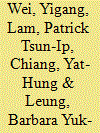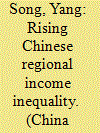|
|
|
Sort Order |
|
|
|
Items / Page
|
|
|
|
|
|
|
| Srl | Item |
| 1 |
ID:
127772


|
|
|
|
|
| Publication |
2014.
|
| Summary/Abstract |
To curb price speculations and overheated investment in the real estate market, the mainland Chinese government has determined to tighten bank lending to the market in recent years, by resorting to administrative tools through specific real estate control policy. With hindsight, the market response seems to have invalidated the policy initiatives. This research is aimed at investigating the impediments to achieving the laudable policy objectives of using administrative credit controls. A series of research interviews with property practitioners unraveled prevalent evasive practices and illicit tactics adopted by developers to thwart policy effects. This study leads to a better understanding of the institutional backdrop behind the less-than-expected results of the real estate macro-control measures. To better steer the real estate market, effective monetary control requires both the government and industry to make concerted efforts and consistent headway towards a complete, transparent and responsive ensemble of institutional arrangements.
|
|
|
|
|
|
|
|
|
|
|
|
|
|
|
|
| 2 |
ID:
124563


|
|
|
|
|
| Publication |
2013.
|
| Summary/Abstract |
This article examines the quantitative effects of the Chinese fiscal system on the increasing regional income inequality in China, from 1978 to 2007. Fiscal decentralization is a multifaceted concept not likely to be captured by a single measure. This paper investigates the evolution of three aspects of fiscal decentralization including spending decentralization, revenue decentralization, and autonomy power, and tests the effects of each aspect on the regional income inequality in China in the past thirty years. Several critical findings were obtained through econometric analysis. The fiscal decentralization on spending side in China has contributed to rising income inequality over the last three decades. On the revenue side, the fiscal system became more decentralized from mid-1980s to 1994, and re-centralized after the 1994 tax sharing reform. The econometric analysis shows that the increase in revenue share of local governments from mid-1980s to 1994 indeed increased regional inequality, while the revenue re-centralization in 1994 only had a modest effect on reducing regional inequality. In terms of autonomy power measured by how public spending at local level of government is maintained by its own revenue, the degree of fiscal decentralization decreased since mid-1980s, and experienced a sharp reduction in 1994 due to the tax sharing reform. The autonomy power has mixed effects on regional inequality in the two periods, before and after the 1994 reform, depending on the targeting of fiscal transfers and the incentives of local governments. As it turns out, fiscal decentralization may not be automatically equalizing or anti-equalizing, whereas how fiscal decentralization is promoted is important for how it impacts regional inequality.
|
|
|
|
|
|
|
|
|
|
|
|
|
|
|
|
| 3 |
ID:
133951


|
|
|
|
|
| Publication |
2014.
|
| Summary/Abstract |
We argue that interjurisdiction competition in authoritarian regimes engenders a specific logic for taxation. Promotion-seeking local officials are incentivized to signal loyalty and competence to their principals through tangible fiscal revenues. The greater the number of officials accountable to the same principal, the more intense political competition is, resulting in higher taxation; however, too many officials accountable to the same principal leads to lower taxation due to shirking by uncompetitive officials and the fear of political instability. Using a panel dataset of all Chinese county-level jurisdictions from 1999-2006, we find strong evidence for an inverse U-shaped relationship between the number of county-level jurisdictions within a prefecture-our proxy for the intensity of political competition-and fiscal revenues in most provinces but not so in politically unstable ethnic minority regions. The results are robust to various alternative specifications, including models that account for heterogeneous county characteristics and spatial interdependence.
|
|
|
|
|
|
|
|
|
|
|
|
|
|
|
|
|
|
|
|
|